WHO strengthens health emergencies response in northwest Syria
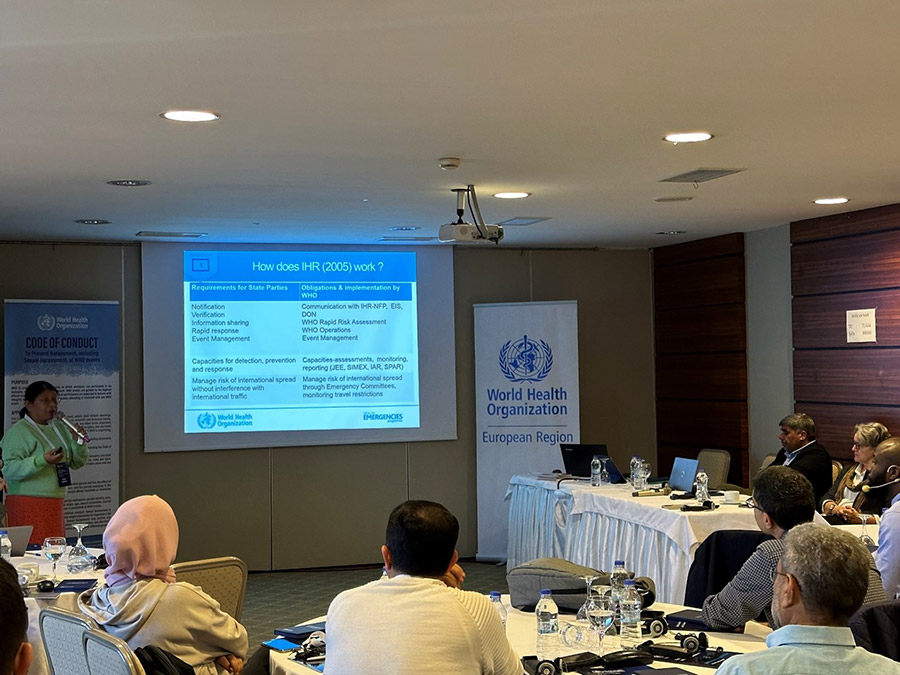 Training on risk assessment and outbreak investigations. Photo credit: WHO/WHO Gaziantep Field Presence Office5 December 2023, Cairo, Egypt, and Gaziantep, Türkiye – To strengthen the response to disease outbreaks and public health emergencies in northwest Syria, WHO conducted a training on risk assessment and outbreak investigations in Gaziantep, Türkiye.
Training on risk assessment and outbreak investigations. Photo credit: WHO/WHO Gaziantep Field Presence Office5 December 2023, Cairo, Egypt, and Gaziantep, Türkiye – To strengthen the response to disease outbreaks and public health emergencies in northwest Syria, WHO conducted a training on risk assessment and outbreak investigations in Gaziantep, Türkiye.
The training was for 24 health professionals from northwest Syria who are engaged in the implementation of early warning, alert and response network. Led by the WHO Regional Office for the Eastern Mediterranean and the WHO Field Presence Office in Gaziantep, the training ran from 27 to 29 November 2023.
Participants are now equipped with the knowledge and skills to address health risks and acute public health emergencies in a more timely and effective manner.
“The training provided a great opportunity for health actors to work in the same direction and to the same standard operating procedures to better detect, assess, report and respond to public health events,” said Ms Rosa Crestani, Head of Office, WHO Gaziantep, in her opening remarks.
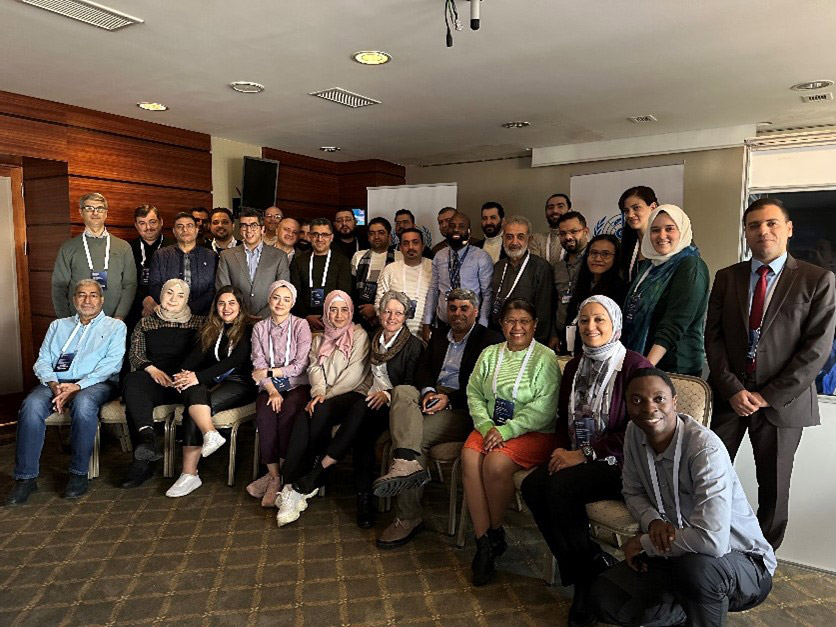 Training participants. Photo credit: WHO/WHO Gaziantep Field Presence Office The training boosted participants’ skills in conducting rapid risk assessments and situation analysis during public health emergencies and acute events in northwest Syria. Health actors from northwest Syria will collaborate with WHO Gaziantep and the WHO Regional Office in future to ensure rapid intervention during outbreaks.
Training participants. Photo credit: WHO/WHO Gaziantep Field Presence Office The training boosted participants’ skills in conducting rapid risk assessments and situation analysis during public health emergencies and acute events in northwest Syria. Health actors from northwest Syria will collaborate with WHO Gaziantep and the WHO Regional Office in future to ensure rapid intervention during outbreaks.
“We hope that this training will also strengthen collaboration between WHO and its partners and among partners themselves, and that the training can cascade down to other partners working in northwest Syria,” said Dr Aura Corpuz, Team Lead, Public Health Intelligence, Health Emergency Information and Risk Assessment Unit, WHO Regional Office.
This training is vital given the severe, long-term disruption to northwest Syria’s health system, which has been made worse by COVID-19, other disease outbreaks, the February 2023 earthquake and renewed hostilities.
Moreover, the political and administrative context in northwest Syria, and the absence of a health ministry, make it increasingly challenging to report through the International Health Regulations (2005). Timely and effective risk assessment and outbreak investigation are thus more important than ever to control diseases and prevent and manage public health emergencies. Such efforts are critical to strengthen health emergency response in this setting.
This training is part of a series of trainings offered by the WHO Regional Office that aims to strengthen the capacities of Member States and territories to conduct rapid risk assessments and public health situation analysis.
WHO and Syrian Ministry of Health joint evaluation mission finds EWARS effective and recommends updates
19 November 2023, Damascus, Syria¬ – WHO and the Syrian Ministry of Health recently completed a joint evaluation of the country’s main disease surveillance system, the Early Warning, Alert and Response System (EWARS). Throughout the crisis in Syria, EWARS has been instrumental in detecting outbreaks of measles, cholera and other diseases and preventing their further spread. Health facilities across Syria submit weekly surveillance data to the Ministry of Health in Damascus for consolidation, analysis and response.
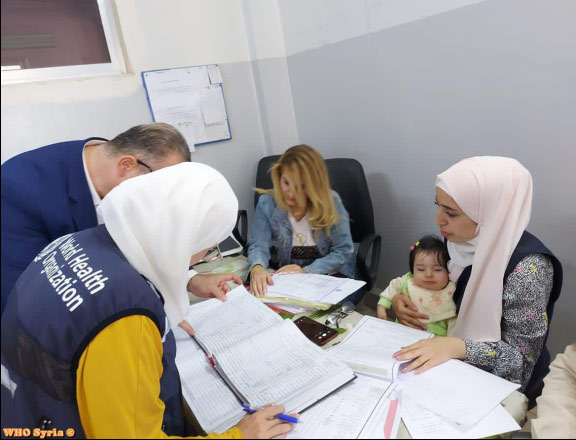 The EWARS mission team meets with local health officials in rural Damascus.
The EWARS mission team meets with local health officials in rural Damascus.
Photo credit: WHO/WHO Syria
The evaluation team, comprising experts from the WHO Regional Office for the Eastern Mediterranean, WHO Country Office in Syria and national counterparts, assessed 46 health facilities and laboratories in 13 Syrian governorates. The team’s preliminary findings indicate that EWARS is working effectively, with high levels of timeliness, completeness and acceptability – particularly at field level.
The team recommended that the list of diseases under surveillance is revised to include case definitions, and that disease thresholds are reviewed. It also recommended efforts to strengthen staff capacity, data quality and feedback loops.
Dr Iman Shankiti, Acting WHO Representative in Syria, said that the evaluation was timely: “The last evaluation of EWARS dates to 2017. This recent assessment is critical to help us ensure that EWARS remains agile and fit for purpose. We are committed to work with the Ministry of Health to strengthen EWARS and make it even more effective.”
Dr Sherein Elnossery, of the Infectious Hazards Prevention and Preparedness unit at the Regional Office, said that EWARS is a lifeline for people in Syria in the face of ongoing conflict and uncertainty. “EWARS has proven to be resilient, even in the face of the devastating earthquake that hit the country this year. By providing early warnings of outbreaks and emerging threats, it helps to save lives and protect the health of communities. I am proud to be part of the team working to strengthen this vital system.”
WHO will use the mission recommendations to develop a plan to strengthen EWARS and further increase its capacity to detect and respond to disease outbreaks and emerging threats.
For Syria’s earthquake victims, the suffering continues
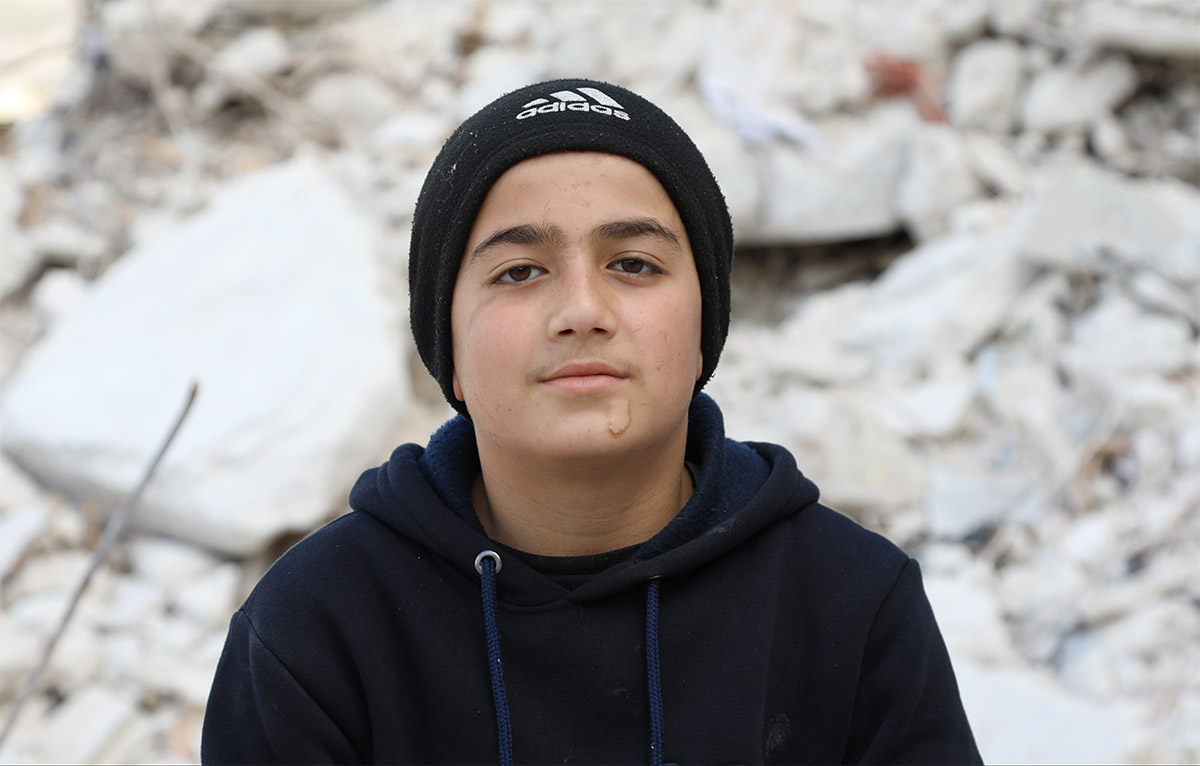 25 October 2023 – Thirteen-year-old Ahmad was asleep at home in Azmarin, a small village in north-west Syria, when the house began to shake violently in the middle of the night. The deadly earthquakes of 6 February 2023 had begun.
25 October 2023 – Thirteen-year-old Ahmad was asleep at home in Azmarin, a small village in north-west Syria, when the house began to shake violently in the middle of the night. The deadly earthquakes of 6 February 2023 had begun.
Moments later, the house had collapsed, burying Ahmad, his parents, sister and younger brother under the rubble. By the time rescuers reached the family, only Ahmad and his brother Omar were still alive. The boys were rushed to Al Rahma Hospital in Darkoush, where they were treated for their injuries. Once their health had stabilized, they were taken in by relatives.
The physical scars of the disaster may have healed, but the mental wounds run deep, particularly for Ahmad. He has told doctors he is “overwhelmed with sadness”. Ahmad often returns to visit Azmarin, seemingly still in disbelief over his loss, spending most of his time near the ruins of his former home and at the graves of his family members who perished.
Ahmad is being monitored by health professionals, with the support of the Syrian Expatriate Medical Association, and he receives special care, including protection and rehabilitation services. Doctors fear the devastating impact of the earthquake may have a more substantial impact on his future development.
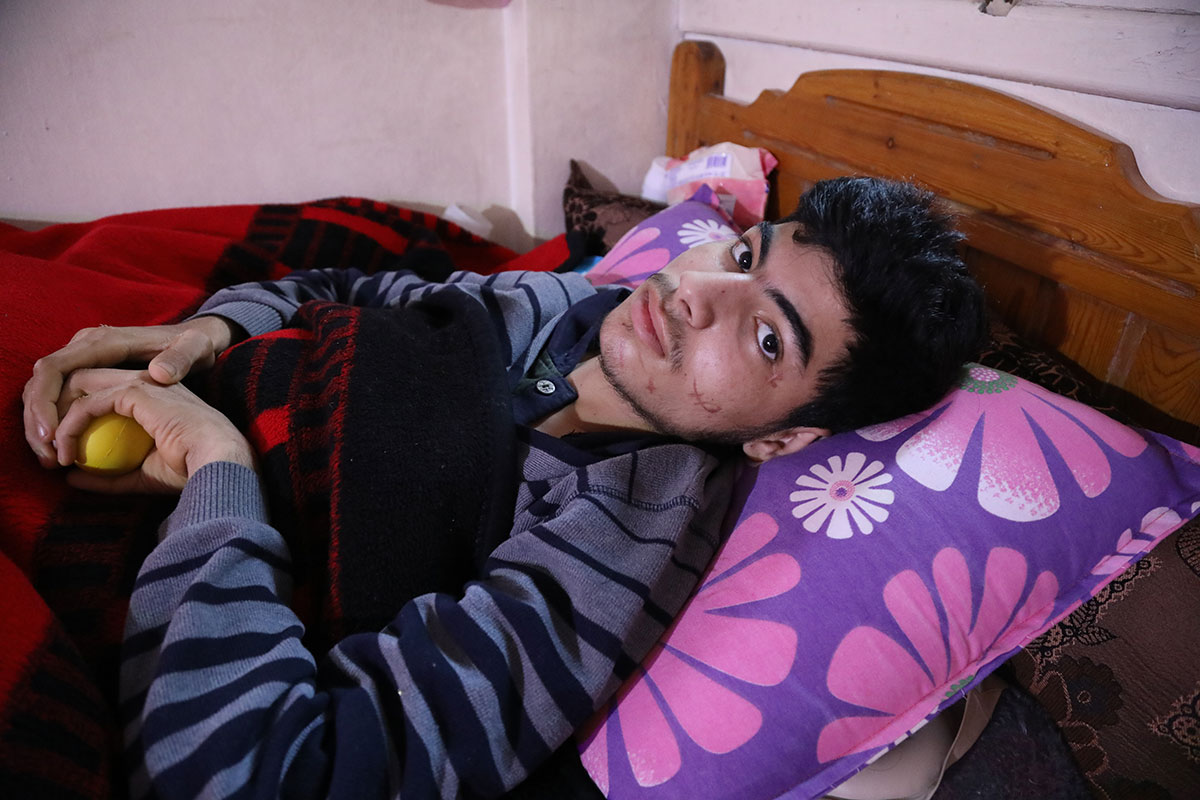 Like Ahmad and Omar, Abdul-Halim was also living in Azmarin at the time of the earthquake. His story is remarkably similar.
Like Ahmad and Omar, Abdul-Halim was also living in Azmarin at the time of the earthquake. His story is remarkably similar.
Abdul-Halim was also asleep at home when the earthquake struck, as were most of the people affected by the disaster. The house was reduced to rubble in seconds, burying the young boy and many members of his family, including his parents, 2 sisters, an uncle, and the uncle’s wife and cousin.
A rescue team found Abdul-Halim beneath the rubble right after the earthquake and took him to Al Rahma Hospital for emergency treatment. He was then moved to Azmarin Hospital to continue his rehabilitation, spending nearly 3 weeks there. Abdul-Halim later found out that he and his 12-year-old sister were the sole survivors of the earthquake among their household.
Abdul-Halim is unable to move and is currently bedridden. His sister suffered multiple bruises and a fractured right arm and underwent surgery. The incident also caused significant psychological wounds. Severely traumatized, Abdul-Halim lives in constant fear. This has been most acute during the thousands of aftershocks that have continued to rattle the Eastern Mediterranean Region since the major earthquakes of 6 February.
Abdul-Halim now lives with his grandparents and requires mental and physical support. He also needs financial support to cover the expense of his care, including to meet the cost of his specific dietary requirements.
“Both Ahmad and Abdul-Halim have undergone experiences that most of us cannot even begin to imagine. To lose almost your entire family in minutes is almost impossible to comprehend. It is no wonder that they – and the thousands of other people in Syria who have been similarly affected – are now suffering severe mental health trauma,” said Dr Idris Elrasheed, Acting Head of the WHO Health Emergencies field office presence in Gaziantep, Türkiye, which oversees operations in north-west Syria.
“WHO recognizes that mental health and psychosocial support in earthquake-affected areas is critical and must be strengthened to ensure that those who have suffered can continue to lead healthy and prosperous lives,” stressed Dr Elrasheed.
WHO and Ministry of Health illuminate the path to a more resilient Syria on World Mental Health Day
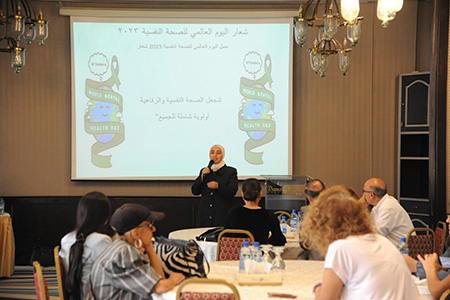 10 October 2023, Damascus, Syria – To mark World Mental Health Day, WHO and the Syrian Ministry of Health launched a 2-day workshop for media professionals to emphasize this year’s theme, “Mental health is a universal human right.” The activity aims to improve knowledge, raise awareness and drive actions that promote and protect everyone’s mental health.
10 October 2023, Damascus, Syria – To mark World Mental Health Day, WHO and the Syrian Ministry of Health launched a 2-day workshop for media professionals to emphasize this year’s theme, “Mental health is a universal human right.” The activity aims to improve knowledge, raise awareness and drive actions that promote and protect everyone’s mental health.
“It’s essential to underscore that mental health is not a luxury; it is a basic human right,” said Dr Iman Shankiti, Acting WHO Representative in Syria. “Regardless of who we are or where we come from, everyone deserves the highest attainable standard of mental health. This not only entails prevention, but also includes access to quality mental health care.”
Many years of crisis have affected the health and mental well-being of people in Syria. The negative impacts have been further exacerbated by the COVID-19 pandemic, disease outbreaks, the recent earthquake and the country’s ongoing economic challenges.
WHO has responded with mental health initiatives that have reached more than 922 000 individuals in 2023 alone. Over 197 000 people in earthquake-affected areas have benefited from integrated and specialized consultations at primary health care centres, and mental health and psychosocial support (MHPSS) services have been provided to more than 161 000 individuals. Moreover, WHO has invested in training over 3000 health and community workers to ensure the sustainability of these essential services.
To promote a multisectoral approach to services, WHO has also supported the Ministry of Health in developing and rolling out the national mental health and psychosocial support (MHPSS) strategy. This strategy, which involves numerous partners and stakeholders, clarifies the vision, goals and actions that will guide the phased enhancement of MHPSS services from 2023 to 2027, in line with regional and global frameworks.
To pave the way for a healthier, more resilient future, WHO emphasizes the critical importance of healing the minds and spirits of everyone in Syria who has been deeply affected by years of turmoil. WHO remains ready to lend its expertise and resources to support this effort.


